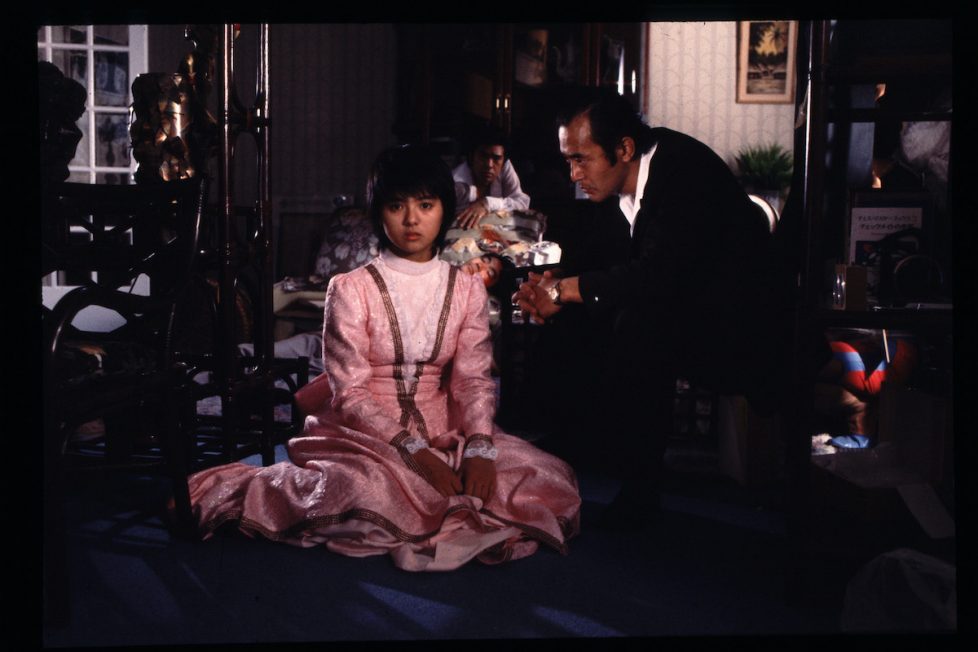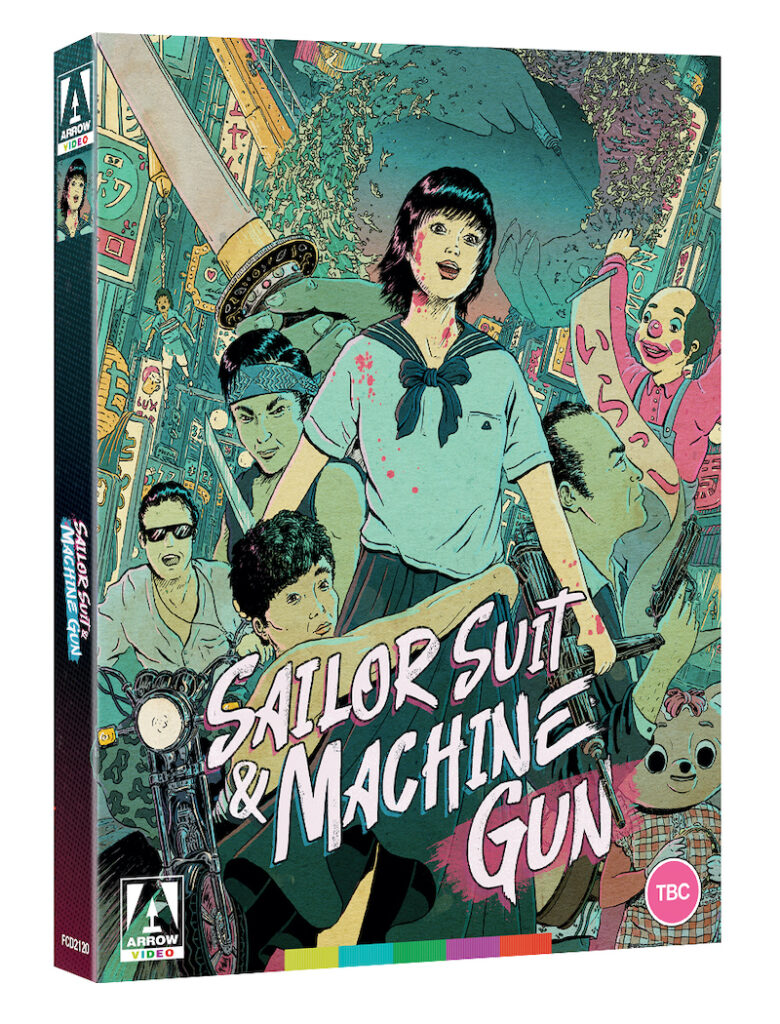SAILOR SUIT AND MACHINE GUN (1981)
A teenage delinquent schoolgirl named Izumi Hoshi inherits her father's Yakuza clan.

A teenage delinquent schoolgirl named Izumi Hoshi inherits her father's Yakuza clan.


The strange yet brilliant Sailor Suit and Machine Gun / Sêrâ-fuku to kikanjû was a big hit in Japan, helping launch the pop career of its lead actress, while also leading to two television series and a 2016 “spiritual sequel” of the same name. However, its success failed to reach western audiences, so Arrow Video’s new Blu-ray will hopefully increase awareness and appreciation of the movie outside of Asia.
The striking title, Sailor Suit and Machine Gun, refers to the school uniform of Japanese girls rather than any maritime hijinks. Delinquent schoolgirl Izumi Hoshi (Horoko Yakushimaru) inherits her late father’s yakuza clan. She objects to being handed the position but Sakuma (Tsunehiko Watase), her seasoned second-in-command, states “there are no rules on a chairman’s age or gender.” In a country where female roles are kept rigid, this transgressive coming-of-age fairy tale finds Izumi venturing into the underbelly of gangland Tokyo and into a dark world of drug trafficking. There’s sweetness and comedy, but mixed with violence and giallo-style sequences, which make this movie a bizarre yet incredibly memorable experience. It has edgy and disturbing themes which may be off-putting to some, but these mostly reflect cultural differences and help explain why the film didn’t translate easily to the west. And while there are shades of Tokyo Drifter (1966), it firmly exists in a 1980s milieu.
Director Shinji Sōmai learnt his craft making “Roman porn” films for the Kikkatsu studio, which seem reminiscent of Italian giallo. They were commercial, needed a certain amount of softcore nudity, but apart from that there was enormous freedom to experiment with plot and cinematography. Sōmai then progressed to more independent films, many featuring younger adults and coming-of-age themes. Sailor Suit and Machine Gun showcased the aforementioned J-pop singer Horoko Yakushimaru as Izumi, and her song “Sailor Fuku to Kikanjū” was used for the end sequence of the film—helping it top the pop charts in Japan for five consecutive weeks, meaning Yakushimaru became as ubiquitous as Kylie Minogue in her native land. The screenplay was adapted from a bestselling novel by mystery writer Jiro Akagawa and the plot stayed true to its source. Sōmai gathered a cast of experienced and accomplished actors to support the young Yakushimaru—notably Tsunehiko Watase as Sakuma, Akira Emoto as Detective Kuroki, and Rentaro Mikuni (who puts in an impressive performance as arch villain Fatso). The longer Director’s Cut features more psycho weirdness at evil Fatso’s secret base.
The cinematography also turns Tokyo itself into a character. There are many candid shots of characters walking down side streets which evoke Beat Takeshi’s Violent Cop (1989), and the views from the corporate HQ of the main rival gang gives a dizzying panorama of the city. There are also many long shots of the actors from outside apartment windows, so we’re watching the action from a distance, which is a Japanese tradition that places the viewer almost as a ghost shadowing the action. In another scene Izumi and Sakuma hold an important conversation during a funeral ceremony on a rooftop which is all filmed in a long shot. The heroine is even introduced via a long shot which slowly pans down to her singing snatches of her father’s favourite song while holding a childish acrobatic pose outside a crematorium! Another excellent sequence finds a biker gang riding through the Tokyo streets at night (filmed in a continuous shoot, so they had to avoid driving through a red light outside a real police station).
The soundscape of the film is a strange mix. When Izumi first meets her yakuza clan in her school playground, the sound of summer insects is deafening, and muzak dominates her café meeting with Detective Kuroki. There are hardly any close ups of Izumi, and her hit song is reserved for the final odd sequence where, dressed in a sailor suit and red stilettos, she stands on the subway grate in reference to Marilyn Monroe’s famous skirt-lifting sequence in The Seven Year Itch (1955).
The accompanying contemporary documentary on this Blu-ray interviews the assistant director Koji Enomoto and actor Akira Emoto, while media experts to give useful context for the film’s impact on the youth of Japan at the time (where it was so popular cinemas were overflowing), and explains the studio system that developed Sōmai’s unique talent. Sōmai sadly died in 2001, and it seems he was highly respected and influential in Japan but too shy to translate as an auteur director in the west.
However, it’s hard to imagine western cinephile directors such as Quentin Tarantino and Luc Besson not being aware of this movie, as it seems to have influenced some of their work. A few themes in Leon (1994), such as the troubling undercurrents between teenage Mathilda and adult Leon (Mathilda likewise impersonates Marilyn Monroe) suggests Besson had taken direct inspiration from Sailor Suit and Machine Gun.
JAPAN | 1981 | 112 MINUTES (THEATRICAL) •131 MINUTES (DIRECTOR’S CUT) | 1.85:1 | COLOUR | JAPANESE

director: Shinji Sōmai.
writers: Yōzō Tanaka (based on the novel by Jirō Akagawa).
starring: Hiroko Yakushimaru, Tsunehiko Watase & Akira Emoto.
